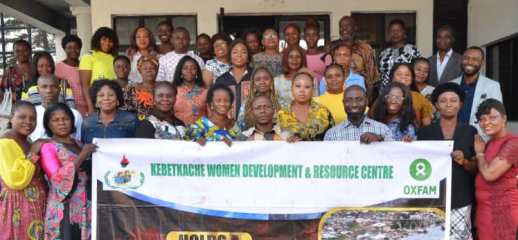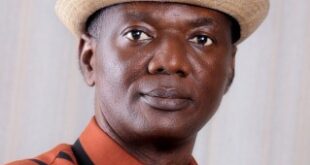By Paul Williams
A town hall meeting on climate change mitigation and adaptation strategies, tagged ‘Town Hall Meeting on Climate Change Mitigation and Adaptation,’ organized by Kebetkache Women Development & Resource Centre, ended Tuesday in Port Harcourt, the Rivers State capital, with a focus on the recent flooding that ravaged communities in the Niger Delta.
Organised by Kebetkache, with support from Oxfam, the meeting brought together rural women and men from impacted communities in Rivers and Akwa Ibom states, with the aim of aggregating community experiences and voices towards adopting climate change mitigation strategies.
More than a million people in the Niger Delta, mostly in Bayelsa, Delta and Rivers states, were displaced and forced from their homes and communities by the flood waters that ravaged the region in the last few months.
The total number of deaths and destruction caused by the floods is still uncertain as of the time of writing this report.
According to participants at the Tuesday’s town hall meeting, as amplified by one of them, Dr Patience Osaroejiji, women in the rural areas were the most impacted by the flooding and other disasters.
One of the rural women at the meeting, Blessing Ayiga, from Okunuga community in Abua/Odual Local Government Area of Rivers State, said the floods came “like a thief in the night.”
“When we noticed the flood, it started gradually. But before we knew what was happening, the flood was right there at our doorsteps. We were unable to harvest our crops; most of them were destroyed in the flood. Our homes were submerged by water, and we had nowhere to sleep.”
She said the situation became “a living hell” for the women of the community who had the burden to care for children and the elderly trust on them, with the equal loss of access to proper sanitary condition, privacy and health care.
Her story finds semblance in the experiences of members of Okwuzi community in Ogba/Egbema/Ndoni Local Government Area.
Mrs Peace Mgbenwa, told our correspondent at the meeting that at the height of the flooding, “Okwuzi as a community had been flooded by 90%. It was only a few places that were still remaining for the flood to cover the whole community.
“It is not only Okwuzi, Aggah, Mgbede and Ebeocha are covered. Ukpazi is no-go area, others too. These are all communities in Egbema. It is only Okwuzi, Mgbede and Aggah that you will have small space where people are staying. All other places were flooded,” she said.
Mgbenwa and Ayiga’s experiences formed part of the voices of rural women in the Niger Delta, with regards to the negative impact of climate change, which the town hall meeting sought to amplify.
Program officer at Kebetkache, Idongesit Smart, noted the negative impact of climate change, which resulted to the ravaging floods, while describing phenomenon (climate change) as the latest problem facing humanity.
Stressing the impact of the flooding, which displaced communities, forcing them into IDP camps, Smart stressed that rising sea levels, acidifying of oceans and rain water, negative impact on bio-diversity, intense heat, change in weather patterns, food insecurity and animal migration among others all signal the grave danger faced by humans.
“We use to experience harmattan; now, we no longer have harmattan. We don’t even know when it is raining season or dry season. Everything is changing; even the human body is not left out. Animals are being forced from the wild into the community, such as happened in Okposi in Rivers State where the floods brought a large sea snake into the community.”
Smart said that the issues now facing humanity, which prompted Kebetkache to organise the town hall meeting, are those of evolving mitigation and adaptation strategies towards preventing or reducing the impact of climate change.
These measures, she said, should include reduction in the emission of greenhouse gases, switching from the use of fossil fuels to renewable energy and smart agricultural practices among others.
A community leader from Bodo, in Gokana Local Government Area, Pius Dukor, commended Kebetkache for providing a “good platform for community people to come together, share our experiences and rub minds on ways of mitigating some of these climate issues.
“It is a way of letting people who are not aware to know, because there are many of these problems in so many communities. Especially where I raised the concern that people are throwing waste, into the river, and the methane from house waste, and industrial waste from companies, are killing our fishes.”
Dukor lamented the impact of oil exploration and exploitation on the environment, especially the devastations caused by oil spill and gas flares, as he called on The Federal Government to ensure consistent supply of kerosene to the populace, so as to forestall deforestation and the harmful impact of illegal refining, otherwise known as kpo-fire.
The handling of waste, according to Dr Patience Osaroejiji, remains one of the steps towards mitigating flooding. She said the blocking of drains and waterways are in no way helping efforts to mitigate the impact of flooding on the community.
 PH Mundial – Port Harcourt Online Newspaper News Across The Region
PH Mundial – Port Harcourt Online Newspaper News Across The Region





